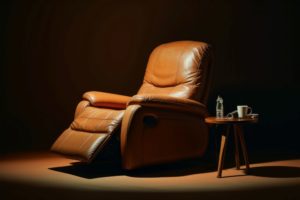
Those with sleep apnea are likely intimately familiar with the frustrations of an unrestful night’s sleep. Sleep apnea unfortunately keeps patients from completing the necessary stages of a complete sleep cycle that rejuvenates our minds and bodies during the night. No one wants to wake up feeling groggy and tired, but that’s exactly what happens when we don’t get the rest we require. It can slow our thinking, weaken our immune system, and stunt cell growth and development.
Many people with sleep apnea look for ways to address their sleep issues at home before seeking professional help. One popular remedy is to simply sleep in a recliner! If you’re wondering whether this is effective in easing the symptoms of sleep apnea, keep reading to find out more.
What Is Sleep Apnea?
Sleep apnea is a disorder that interrupts your breathing during sleep. This break can last for ten seconds or more and interferes with your body’s ability to enter and stay in certain stages of the sleep cycle. There are two types of sleep apnea:
- Obstructive sleep apnea (OSA) occurs when the muscles in the back of the throat relax and fail to keep the airway open.
- Central sleep apnea is when the brain doesn’t send the right signals to the muscles controlling your breathing. The airway isn’t blocked in these cases, but your breathing still pauses.
Obstructive sleep apnea is the most common of the two types and is more easily treated.
Does Sleeping In A Recliner Help With Sleep Apnea?
Clinical studies have demonstrated that yes, there were improvements in sleep apnea symptoms for patients sleeping in recliners. This largely applies to those with obstructive sleep apnea, in which the airway is blocked. When your head is slightly elevated, like when you’re relaxed in a recliner, your trunk remains upright, and your airways can stay more open. You are therefore less likely to experience as many disruptions to your breathing when you’re at an incline.
What Else Can Help My Sleep Apnea?
For those who still find they’re not catching enough zzz’s even at an angle, there is still hope! Your dentist can offer CPAP machines and other personalized sleep appliances to minimize symptoms. There are devices that can help your airways stay open by repositioning your jaw, or by delivering accurately measured airflows through a sleep mask.
If you’re having problems sleeping and are desperate for solutions, then call your dentist. They can work with you to figure out whether you’re suffering from sleep apnea and provide solutions. The sooner you reach out, the sooner you’ll get back to the full night’s rest you deserve!
About the Author
Dr. Michael Michel has been providing sleep dentistry and TMJ-related care in the Topeka area for more than 20 years. He received his Bachelor of Science from Kansas State University, followed by his Doctor of Dental Surgery from the University of Missouri-Kansas City School of Dentistry. With decades of expertise, he can help you find solutions for your sleeping problems. If you’d like to schedule a consultation, please feel free to request one on the website or by calling (785) 273-0802.
